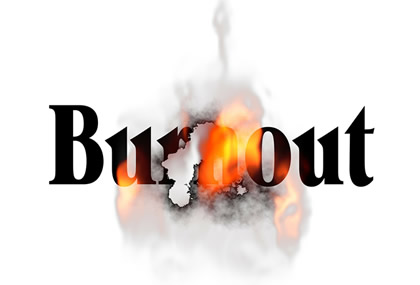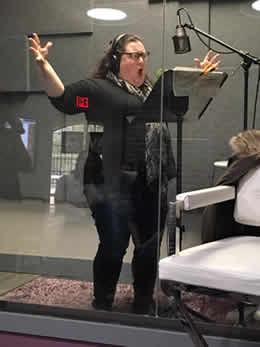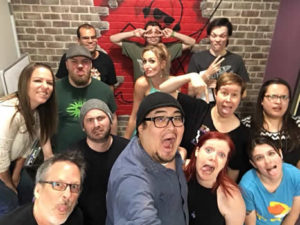 You know when you can’t get any recording done because your inner critic just won’t shut up?
You know when you can’t get any recording done because your inner critic just won’t shut up?
Yeah, me too. It’s the WORST.
Don’t get me wrong—there’s a time and a place for that critic! Critically listening back to your performance can help you determine which changes you need to make to make your read believable (and bookable).
But sometimes, like a particularly persistent, loud cat, that critic voice butts its head into your business when you’re trying to perform, stopping you dead in your tracks and opening the door for your old pal, Self-Doubt.
If you’re feeling stuck during auditions, here are five ways to get out of your own head:
1. Take a Break.
 Hi, I am your mom now. And I mean it: Take. A. Break. Sometimes, when you’re over-thinking a read, it means you need to take a breather! Stepping away from the booth—physically getting out of there and going to a different location—can help reset your brain. It gives you an opportunity to catch your breath, focus on something else, and regroup. Then, when you’re feeling ready, you can head back in. Every single person in the world needs to take breaks. You know why? Because we’re all just very tall, very articulate toddlers—sometimes, you need to give yourself permission for nap time (…literally. Oh, man, naps are the best. Your brain and body will thank you).
Hi, I am your mom now. And I mean it: Take. A. Break. Sometimes, when you’re over-thinking a read, it means you need to take a breather! Stepping away from the booth—physically getting out of there and going to a different location—can help reset your brain. It gives you an opportunity to catch your breath, focus on something else, and regroup. Then, when you’re feeling ready, you can head back in. Every single person in the world needs to take breaks. You know why? Because we’re all just very tall, very articulate toddlers—sometimes, you need to give yourself permission for nap time (…literally. Oh, man, naps are the best. Your brain and body will thank you).
2. Vocalize your feelings.
Feeling frustrated because you just can’t get that read right? Are you angry? Sad? Absolutely hating the copy? Say it OUT LOUD. And I mean everything—curse words and all (it’s okay. I’m your mom, remember? You can say bad words, it’s fine, I’ll still love you). Bottling your feelings up only makes things worse—it’s impossible to carry on with a read pretending like everything’s fine when all you really want to do is scream.
So do it. Scream! (turn your mic down or off first, though). Scream, yell, curse. Express, out loud, how you’re feeling. Get it out! No one is listening, no one is watching—it’s just you, in your booth, in your own home, working out your frustrations. There is NOTHING WRONG with feeling upset or confused or frustrated in the booth—it’s going to happen! Acknowledge it and get it out!
Remember Poltergeist? Getting all those feelings out allows you to say, “This house is clean” and then take on the read with all that emotional weight off your shoulders.
Plus, you might also get rid of the ghosts haunting your new suburban family home. It’s a win-win, right?
3. Get silly.

TVAS student Thomasina Rose gets wacky in the booth!
This one is my favorite because I am professional weirdo. Sometimes, when we’re feeling stuck on a read, it’s because we’re taking ourselves way too seriously. And yes, some scripts are serious. But we often put too much pressure on ourselves to make it perfect, which is a losing battle because (spoiler alert) there is no such thing as perfect.
I call this technique the “fart at a funeral.” It’s comic relief. If you’re stumped, stuck, or ready to tear up the copy and chuck it into a fire, it’s time to diffuse the tension and get SILLY.
Got a complicated medical read you’re struggling with? Do a practice take in the most over-the-top cowboy accent you can manage. Just can’t nail down that car commercial? Read it like a maniacal comic book villain. Whatever you do, make it big and over-the-top. Obviously, you won’t submit this silly take—it’s just for you, to remind yourself to relax and HAVE FUN. Break that tension with some party time, buddy. It’s going to be okay.
4. Move it.
I’m a pretty active person, and one thing that helps me when I’m struggling with a read is to get out of my booth and do some exercises to physically, well…exorcise all those frustrations (hello, Poltergeist reference number two).
Whatever physical activity helps you calm down is perfect: stretching, yoga, running, jumping, punching the absolute crap out of that punching bag your friend bought you last year for your birthday that’s been gathering dust in the garage…just move it! Exercise releases a beautiful little chemical called serotonin, which promotes concentration, feelings of calmness and happiness—all of which can put you in a better mental space to audition. You don’t need to be Rocky, but just getting your body in motion can help hit the reset button and leave you better equipped to break down a piece of copy.
5. Use those lead-ins!

It’s important to move it in the booth—and that includes your face!
I am a huge fan of lead-ins and use them on almost everything I voice, from corporate reads to commercials. If you’re not familiar with the term, a lead-in is a word or phrase or short dialogue that you improv before you launch into the actual script. It helps get you warmed up and eases you into the copy, kind of like wading gently into the pool instead of just abruptly belly-flopping into the pool.
Lead-ins can help you relax and, in turn, make the read sound more natural. Often, when you’re overthinking a script, you might just need to warm yourself up. Enter the lead-in!
You can do a few things with your lead in, depending on what works best with the script:
- A quick sound or word, like “okay,” “so…” etc. Whatever feels natural!
- A short phrase, like “Here’s the deal,” or “Listen, I get it,” or “Hey, man, I know how it is.”
- A longer dialogue that “walks you into” the script. I do this when I’m really having a hard time so I can talk to someone specific (that’s another important thing—you should always know who you’re talking to in every script!).
For example, let’s say the script starts with, “Getting health insurance is more important than ever this fall.” I’ll pick someone specific to talk to; then, I’ll “talk myself into” the script like this:
“Hey, Dad. Listen, I know it’s not always fun to do, and it can be a little bit of a boring process, but I care about you and getting health insurance is more important than ever this fall.”
This way, you’re tricking yourself—by the time you get to the script, it feels like you’re already having an easy, natural conversation with someone you know, and that conversational tone will translate to the rest of the read! You can edit out your long lead-in once you’re done and voila! Easy, breezy, beautiful healthcare read.
Remember not to leave too much of a pause between your lead-ins and the start of the script—you want the energy from your lead in to carry into the script, and pausing for too long interrupts that flow.
Getting out of your own head is going to look different for everyone. The key is to find what works best for you! And just know that it’s going to happen again and again—it doesn’t mean you’re failing. It means you care. And that’s awesome! It’s just about learning to tell that critic to please, for the love of all that is holy, keep its mouth shut while you do your thang.
#3 and #5 will absolutely be my go-tos for this!! Thank you!
Excellent advice, Casey! #3 and #5 are my favorites, sprinkled in with a few ‘colorful’ words here and there. Thanks for sharing this!!!